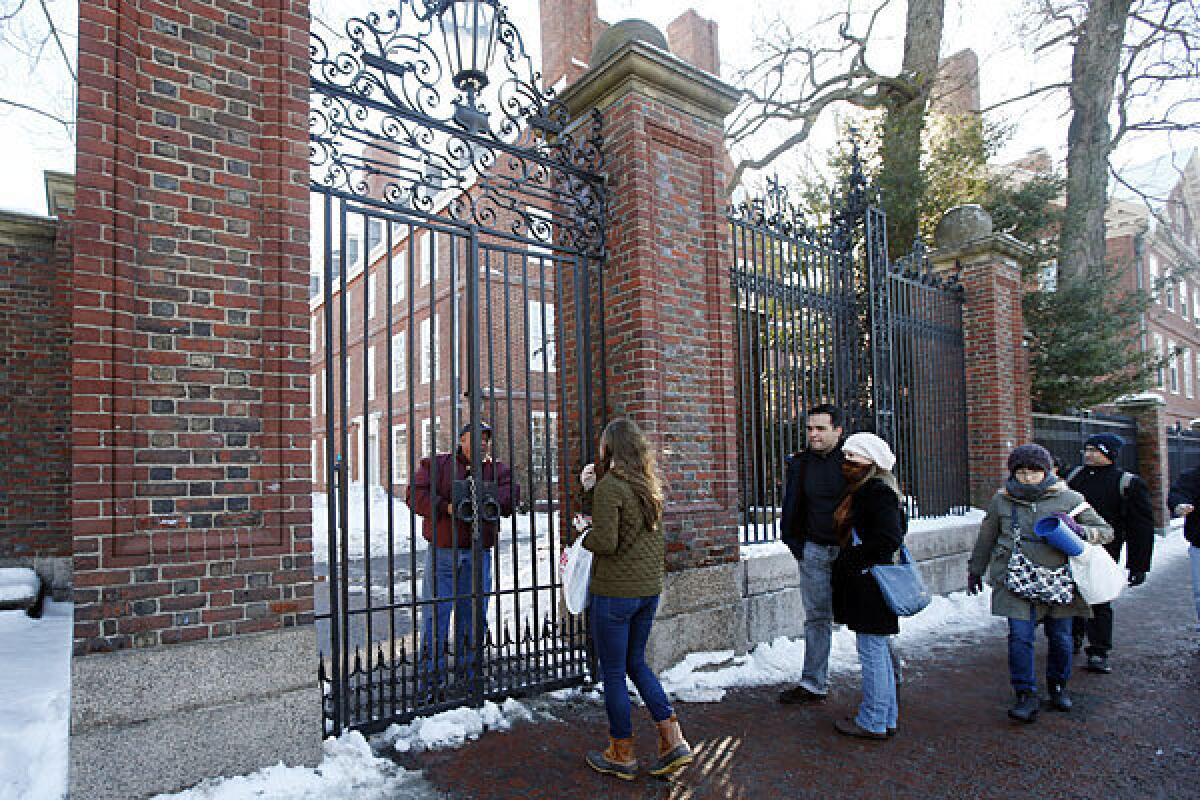Harvard Medical School fined $24,036 for animal welfare violations

- Share via
The U.S. Department of Agriculture fined Harvard Medical School $24,036 on Wednesday for 11 Animal Welfare Act violations, including four animal deaths, from February 2011 through July 2012.
The government’s decision to fine the university wraps up an ongoing investigation of the medical school’s animal facilities. One facility, the New England Primate Research Center, located in Southborough, Mass., announced its decision to close in April.
In a document sent to the university’s Center for Animal Resources and Comparative Medicine, USDA officials outlined the alleged violations.
Passed in 1966, the Animal Welfare Act “requires the basic standards of care and treatment be provided for certain animals bred and sold for use as pets, used in biomedical research, transported commercially or exhibited to the public,” according to a fact sheet posted on the USDA website.
The first listed violation occurred Feb. 20, 2011, when during a procedure on a primate, the anesthetist increased the dose of anesthesia, which caused renal failure and resulted in the euthanizing of the nonhuman primate, the USDA document stated.
Another violation, from Oct. 7, 2011, reported poor handling of a primate. After the primate had escaped enclosure, it was “recovered using a hand-held net.”
Other reported violations involved primates that became dehydrated after treatment. In one occurrence, “an employee failed to provide a water bottle” to the primate, which triggered the dehydration.
Harvard Medical School told the Los Angeles Times in a statement that the “USDA has resolved its review with an agreement that we feel was appropriate.”
“The leadership of the school cares deeply about upholding exemplary standards of care and attributes these outcomes to the excellent work of those members of our community who took aggressive action to institute rigorous quality improvements that benefit animal safety and welfare,” the university said in its statement.
The Assn. for Assessment and Accreditation of Laboratory Animal Care, which assesses standards of animal care, has again granted the medical school full accreditation, the school said in its statement.
When the violations first began to surface, Harvard Medical School was severely scrutinized by the public, leading to several staff and procedural changes at the New England Primate Research Center.
In March 2012, the center’s former director Dr. Fred Wang resigned. A little over a year later, in April 2013, the school announced it would “wind down operations” at the New England Primate Research Center, with a transitional period that would last one to two years, according to a release from the medical school’s website.
In a statement posted on the medical center’s website on April 23, university officials said they made the decision “based on a review of the long-term academic benefits and the financial cost of continuing to operate.”
The decision to conclude operations also followed “a two-year period during which the center leadership successfully addressed operating issues with input from NIH [National Institutes of Health] and other governing agencies.”
According to the Boston Globe, a smaller facility at the Longwood Medical Area, which holds 45 primates, will continue to operate.
As for the remaining primates? By 2015, “they will either be transitioned to other sites, including the other national primate research centers, or be managed at the NEPRC [New England Primate Research Center] in accordance with approved protocols,” the statement said.
ALSO:
Quiz: Test your knowledge of 2013’s national news
Mega Millions win goes coast to coast: Atlanta to San Jose
Former BP engineer convicted on obstruction charge in oil spill case
Twitter: @saba_h
More to Read
Sign up for Essential California
The most important California stories and recommendations in your inbox every morning.
You may occasionally receive promotional content from the Los Angeles Times.











